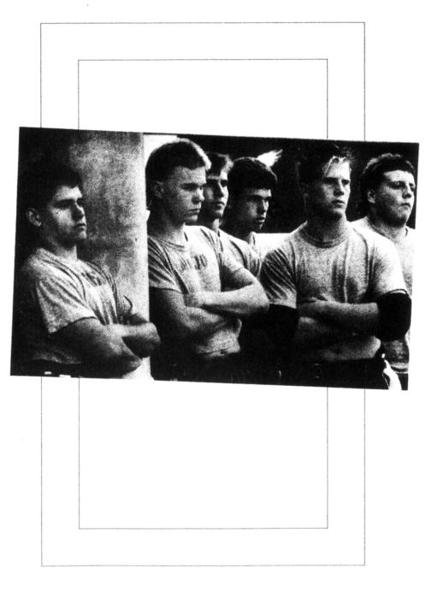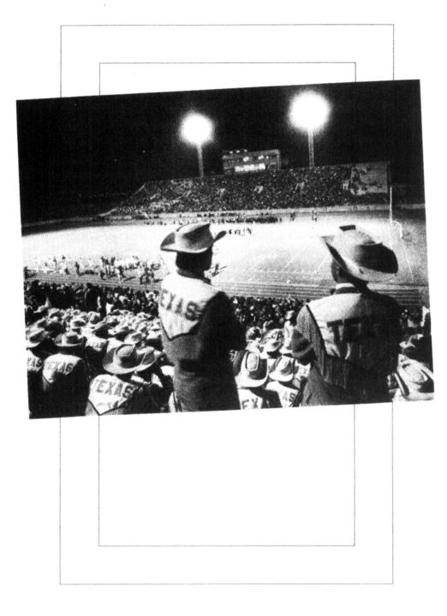Friday Night Lights: A Town, a Team, and a Dream (27 page)
Read Friday Night Lights: A Town, a Team, and a Dream Online
Authors: H. G. Bissinger
Tags: #State & Local, #Physical Education, #Permian High School (Odessa; Tex.) - Football, #Odessa, #Social Science, #Football - Social Aspects - Texas - Odessa, #Customs & Traditions, #Social Aspects, #Football, #Sports & Recreation, #General, #United States, #Sociology of Sports, #Sports Stories, #Southwest (AZ; NM; OK; TX), #Education, #Football Stories, #Texas, #History

West
 I
I
THE NIGHT BEFORE THE FOURTH GAME OF THE SEASON AGAINST
Odessa High, Gaines locked the doors of the field house for a
team meeting. Private gatherings such as this were not held
very often-only when the idea of defeat became not only unthinkable but intolerable. Losing to the cross-town rival from
the west was one of those situations, a possibility even more
horrid to Permian fans than that of Michael Dukakis becoming
president.
To put the game into perspective and draw the proper parallels, Gaines told the players the story of Sam Davis.
Davis had been a Confederate scout during the Civil War
when he came face to face during battle with a scout from the
Union army. With the battle over for the day they sat in the
moonlight and talked, and before they parted the Union scout
revealed secrets about his own army's position. When Davis was
subsequently captured by Union forces, he was told he could
go free if he revealed the name of the person who had given
him the information. But Davis had no interest in such a lowhanded compromise. "I would die a thousand deaths before I
would betray a friend" were his final words.
It was a vignette that was deemed appropriate on the occasion of the Odessa High game, much like the quotation from
H. L. Mencken that had been posted on the field house bulletin
board:
Every normal man must be tempted, at times, to spit on his hands,
hoist the black ling, and begirt slitting throats.
The boys in front of Gaines, out of uniform and away from
the hue and cry usually sparked by their appearance, looked
strangely vulnerable. Dressed in blue jeans and short-sleeved
shirts and well-shined cowboy boots, their hair neatly combed
and their eyes still capable of expressing admiration for stories
such as this, it was one of those rare moments when it suddenly became apparent that they were nothing more than high
school kids.
°I am sure there are many applications that can be drawn
from that little story," said Gaines of Sam Davis's eager willingness to die. "The main applications I get from it are twofold.
One is friendship, and the second one is loyalty.
"We've got a big challenge ahead of us tomorrow night. I
want us to play like fifty-two brothers. All for one and one for
all. I want us to have that cohesiveness, that unified spirit. Fiftytwo people pulling together is hard to beat, men. Fifty-two
brothers are hard to beat.
"We know that OHS is going to be fired to the hilt and I want
to match them emotion for emotion.... It's gonna be a big
crowd. It's an exciting game. 1 wish everybody that has an opportunity to play the game of football all over the United States
had an opportunity to play in a game like this. You're part of a
select group."
As part of the tradition in these meetings, Gaines and the
other coaches then left the room so the captains could address
the players privately.
"I don't care what they think over there," said Ivory Christian. "We oughta just run over them like sixty-two to nothin' or
somethin'. We oughta blow 'em out. I don't think they can stay
on the field with us, man. We play hard like we always do on
Friday night..... We know how they are, the first quarter you
start hittin 'em a couple of times, get a couple of sticks on 'em,
they want to quit."
The next afternoon, the players filtered into the field house to get dressed and have final pre-game meetings. "I don't want
you gettin' blocked by a finesse block. If you get blocked, it better be by a macho man," Coach Belew told the defensive ends.
"I want one hell of a wreck out there. I want that boy to be
sorry he's playin'. Run upfield like a scalded dog. Run upfield
and contain that sucker."


By game time more than fifteen thousand fans had emptied
into Ratliff Stadium, where a full moon, luscious and plump,
sweetened the languid desert night and turned the sky an incandescent blue. On one side were the Odessa High fans,
dressed in red, ready for this to be the year when the jinx was
finally broken, when they joyously shed the yoke of football
famine that had caused them so much embarrassment and
so many feelings of inferiority. On the other side were the
Permian fans, dressed in black, arms folded, looking like highand-mighty music teachers listening to the annual school recital, so used to superlative achievement from their star pupils
that only the most flawless performance would break their cold
impassivity.
The game began. The kickoff fluttered in the warm air amid
shrieks and screams. Permian's Robert Brown took the ball
and barely got to the 15 before he was smothered by a crowd
of Odessa High defenders. They slapped each other on the
helmet after the tackle and ran off the field with exuberance.
Maybe that opening kickoff was an omen. Maybe it meant that
parity had been reached, that tonight was the night for the west
side of Odessa to reach back into history, to show that it too
could excel at what mattered most.
Or maybe it meant nothing at all.
Ducking underneath the offensive line, Winchell took the
snap from center and handed the ball to Billingsley on a tackle
trap. He saw a hole and went for it.
The game was on....
There was no better metaphor for the town, no better way to
understand it-the rapidly changing demographics, the selfperpetuating notions of superiority that spread over one half and inferiority that spread over the other. The PermianOdessa High game had become a clash of values-between the
nouveau riche east side of town and the older, more humble
west, between white and Hispanic, between rich and poor,
between the suburban-style mall and the decrepit, decaying
downtown.
Twenty-three years.
Twenty-three lousy, painful, shitty years without beating Permian, worse than the plague of locusts, worse than rooting for
the Cubs, worse than the Dust Bowl droughts.
Although some had seen slight improvement in recent times,
there was no love lost between the two sides. Savannah Belcher,
who had her own show on cable television here and was the
closest thing Odessa had to Hedda Hopper, called the boundary line separating the two schools "the Mason Dixon line of
Odessa. They're not really at war, but a lot of those scars haven't
quite healed."
Each year there was always the dream that this was finally it,
the game where the juggernaut of Permian would somehow
self-destruct and the sheer emotion of Odessa High would
finally prevail. The possibility of that tantalized everyone,
whether they liked football or not.
Vickie Gomez was a perfect example. During her two terms
on the school hoard she had gotten more than her fill of sports,
and she wondered what good high school football did for the
kids who played it. But even Gomez had intense feelings about
the rivalry because of what a win over Permian would accomplish not only for Odessa High fans but the whole west side of
town-the side of town that seemed to have all the trailer
homes and the apartment courts made of glue and papier-
mache and the junkyards and the sealed-off areas filled with
the hulks of oil rigs that no one wanted anymore, the side of
town that had become identified with white oil field trash and
wetbacks up from the border.
In the forties and fifties, most Hispanics who trickled into
Odessa settled on the Southside. In the sixties and seventies and eighties, the influx of Hispanics rapidly increased and
many began living not only on the Southside but the west side
as well.
Nothing else in town, not even the resurgence of the oil industry in another frenzied boom, could give the west side the
same sort of psychological lift as a win over Permian. Even if
the feeling was momentary, it would put Odessa High on equal
footing with those east-siders who went home victorious time
after time after time to those sprawling ranch houses in those
sweet little cul-de-sacs with those names like something out of a
Gothic romance. But every time the Odessa Bronchos got close
something miraculously had happened-a fumble into the end
zone with the winning touchdown and no time left on the clock,
an unheard-of snowstorm turning a potent offense into mush.
It truly seemed as if' nothing less than fate herself was working against them, somehow had it in for the Bronchos, who
simply could not beat Permian no matter how hard they tried.
"I'm just living for the day that Odessa High beats Permian,"
said Vickie Gomez, the thought bringing a smile to her usually
serious lips. "That's the one thing I'm living for. I'm gonna get
out of this town, but not before that happens."
 II
II